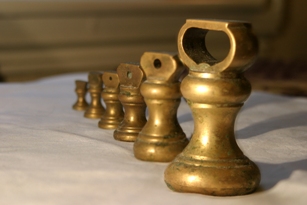Word of the Week - Archive page 3
Use the links below to navigate to the previous words of the week....
Words found on this page:
Quondam
Continuing the Latin theme this week's word is Quondam. This is a rather outdated word which is used to mean 'belonging to some prior time'.
Synonyms of this word include: erstwhile, former, once, onetime, sometime. It originates from the Latin word quom meaning when.
Here are some quotes involving this weeks word:
 "Twas Arthur-a-Bland, the knight's quondam esquire, who brought the tidings, and Robin's face brightened as he heard it."
"Twas Arthur-a-Bland, the knight's quondam esquire, who brought the tidings, and Robin's face brightened as he heard it."
Robin Hood by J. Walker McSpadden.
"I cannot feel friendly toward my quondam fellow-American" Napoleon III.
The Innocents Abroad by Mark Twain.
"The world of tape measures and calico counters seemed so far away; the interior of his quondam lodgings in a by-street of
Islington, so unfamiliar and impossible."
The Malefactor by E. Phillips Oppenheim.
An example of common use: Pope Benedict XVI quondam Joseph Cardinal Ratzinger.
back to top
Mens Sana
This week's word is in fact a phrase, Mens Sana, and is often used in the legal world to mean 'of healthy mind' (i.e. sane, not to be confused with Mens Rea which means 'of guilty mind'). This Latin phrase is taken from Juvenal (Decimus Iunius Iuvenalis) the Roman satiric poet of the late 1st century and early 2nd century AD.
The full Latin phrase is actually "orandum est ut sit mens sana in corpore sano", which means "You should pray for a healthy mind in a healthy body". However, this is usually shortened to "Mens sana in corpore sano" which is "A healthy mind a healthy body". This is a phrase that is familiar to most of us, although you will notice that by shortening
Juvenal is also the source of the famous quote "Quis custodiet ipsos custodes?" meaning "Who shall guard the guardians?" or more colloquially, "Who watches the watchers?". Below is some information about Juvenal, and a couple of exerts from his 3rd satire.
back to top
Juvenal
(taken from Wikipedia)
 Decimus Iunius
Iuvenalis, Anglicized as Juvenal, was a Roman satiric poet of the late 1st century and early 2nd century AD. Very little is known about his life, the ancient biographies being generally fictitious. He was known to be from
Aquinum, and described himself as middle-aged at the time of publication of his first satire, which was sometime in the 100s AD. The latest known date for his activity is 127.
Decimus Iunius
Iuvenalis, Anglicized as Juvenal, was a Roman satiric poet of the late 1st century and early 2nd century AD. Very little is known about his life, the ancient biographies being generally fictitious. He was known to be from
Aquinum, and described himself as middle-aged at the time of publication of his first satire, which was sometime in the 100s AD. The latest known date for his activity is 127.
Little is known about his life except that during much of it he was desperately poor. A tradition tells that as a youth he was banished from court for satirizing an imperial favorite; later his work reveals a deep hatred for the Emperor Domitian. He is known chiefly for his 16 satires, which contain a vivid representation of life in Rome under the empire. They were probably written in the years between A.D. 100 and A.D. 128. The biting tone of his diatribes has seldom been equaled. From the stern point of view of the older Roman standards he powerfully denounces the lax and luxurious society, the brutal tyranny, the affectations and immorality of women, and the criminal excesses of Romans as he saw them, especially in his earlier years. His satire is frequently obscene, particularly in the satire on Women. The subjects covered by his satires also reveal much about the presence of foreigners in Rome (Satire III), the eating habits and entertainments of the rich (Satires IV and XI).
Examples of Juvenal's verse, from his Third Satire:
"since Fortune throws
Her more peculiar smiles on such as those,
Whene'er, to wanton merriment inclined,
She lifts to thrones, the dregs of human kind! "
and from much later in the same text:
"BUT HERE, beyond our power, array'd we go,
In all the gay varieties of show;
And when our purse supplies the charge no more,
Borrow, unblushing, from our neighbour's store:
Such is the reigning vice; and so we flaunt,
Proud in distress, and prodigal in want!
Briefly, my friend, here all are slaves to gold,
And words, and smiles, and every thing is sold."
back to top
Tushery
This weeks word is an interesting sounding one! Tushery (pronounced TOOSH-ery) is a word used to describe poor quality writing that uses archaisms (outdated words) and a pretentious style. The proper use of 'tushery' is to apply it to the kind of bogus 'medieval' or historical novels which attempt (without knowledge) to give a supposed temporal colour with expletives, such as tush, pish, zounds, marry, and the like.
A related word is Gadzookery, which sounds like something Dr Seuss would say but is in fact a noun for 'the use of archaisms'. An example would be:
"Get rid of the gadzookery," Bruce's editor cautioned. "Mirabella can perfectly well say 'please' instead of 'prithee.' "
In fact, historical novels are the prime target for gadzookery. Tushery work is acceptable though, if written in the period from where the archaisms are from. An example of this can be found in "Nicholas Nickleby" by Charles Dickens:
"Gadzooks . . . you astonish me!" cries Mr. Lenville
Gadzooks, in the 1830's, was used as a mild oath probably from the phrase 'God's Hooks' referring to the nails used in the crucifixion. It may also be this word that led to the coining of 'Gadzookery' in the 1950's as a way of describing an affected use of the same sort of language.
Quotes with this weeks word:
"Those who dismiss the historical novel as a piece of pish-tushery should recollect that Tolstoy's War and Peace was also a historical novel."
- Helen Lucy Burke, Irish Press, on The Ionian Mission by Patrick O Brian
"Literature, Mr. Barth seems to say, is so much tushery if you want to be blunt about it; nevertheless, the world has been in love with it for several millennia, never quite aware of what it is."
back to top
Spargefaction
 This weeks word is the delightful word 'Spargefaction' which means to moisten something through the sprinkling of water. It
comes from the Latin expression spargere ~ meaning 'to strew' and facere, factum ~ meaning 'to make'.
This weeks word is the delightful word 'Spargefaction' which means to moisten something through the sprinkling of water. It
comes from the Latin expression spargere ~ meaning 'to strew' and facere, factum ~ meaning 'to make'.
A common device used for Spargefaction is the humble sprinkler. Below you will find some facts about sprinklers that you might not know, so that the next time you are lying awake in a hotel room cursing your jet lag you will at least know a little bit about the sprinklers in the ceiling above you.
Facts about Sprinklers:
A sprinkler is a device used for the distribution of water from plumbing pipes, by spraying it into the air. Sprinklers have two main purposes:
- Irrigation Sprinklers for irrigation of lawns or crops
- Fire Sprinklers for fire suppression within buildings
Irrigation Sprinklers:
Irrigation Sprinklers are used on farms, golf courses, residential yards, and other places to water crops, lawns, gardens or other plants in the event of drought. They are also used for recreation or as a cooling system.
Sprinklers that spray in a fixed pattern are generally called sprays or spray heads.
Higher pressure sprinklers that rotate are called rotors and are driven by a ball drive, gear drive, or impact mechanism. Rotors can be designed to rotate in a full or partial circle.
Guns are similar to rotors, except that they generally operate at very high pressures. In addition to irrigation, guns are used for industrial applications such as dust suppression and logging.
Fire Sprinklers:
Sprinkler systems for fire protection consist of overhead pipes fitted with sprinkler heads. Each head is held closed independently by heat-sensitive seals. These seals prevent water flow until a design temperature is exceeded by the individual sprinkler heads. Seals may be broken by melting (fusing) of metals with a low melting point (often bismuth alloys), or may be glass bulbs that break from pressure differences when heated. Typical sprinkler head activation temperatures are 135 °F (57 °C), 155 °F (68 °C), 200 °F (93 °C), and 286 °F (141 °C), which correspond to the type of hazard the sprinkler system protects against. Life safety hazards, such as residential occupancies, use a lower (therefore quicker) activation temperature.
Each sprinkler activates independently. The design intention is to limit the total number of sprinklers that operate, thereby providing the maximum water supply available from the water source to the point of fire origin.
Sprinklers have been in use in the United States since 1874, and were used in factory applications where fire losses at the turn of the century were often catastrophic in terms of both human and property losses. In the US, sprinklers are today required in all high rise and underground buildings generally 75 feet (23 m) above or below fire department access, where the ability of firefighters to provide adequate hose streams to fires is limited.
According to the National Fire Protection Association, fires in hotels with sprinklers averaged 78% less damage than fires in hotels without them (1983-1987). The NFPA says the average loss per fire in buildings with sprinklers was $2,300, compared to an average loss of $10,300 in unsprinklered buildings.
back to top
Hiatus
generally meaning an interval or gap

- A break in or as if in a material object
- A break in the continuity of a material object; a gaping chasm; an opening or aperture (Now a rare usage of this word).
Opposite is a picture that I took on holiday of a hiatus in a glacier. The glacier is at the top of a mountain in Austria known as Grossglockner - The big bell - and is a popular tourist attraction.
"These holes called Hiatus, differ from wide gapings, in nothing, but that they be lesse, and therefore seeme..deepe pits or holes, and not..gaping"
W. Fulke 'Meteors' (1640)
- a gap or passage in an anatomical part or organ
- An opening or foramen. Also attrib., as hiatus hernia, a hernia in which an organ, esp. the stomach, protrudes through the sophageal opening in the diaphragm.
- A rent or hole in a garment.
"The hiatus in Phutatorius's breeches was sufficiently wide to receive the
chesnut"
1761 STERNE Tr. Shandy IV. xxvii
- A gap or interruption of continuity in a chronological or other series; a lacuna which destroys the completeness of a sentence, account, writing, etc.; a missing link in a chain of events, etc.
- In Logic, A step wanting in a chain of proof; a gap in reasoning or evidence.
- Grammer and Prose The break between two vowels coming together without an intervening consonant in successive words or syllables. The break or interval of silence is necessary in order that the two vowels may be separately heard, when there is no intervening consonant to mark the division between them.
Two words that are related to this weeks word that are also interesting are:
- Scissure - This is a noun from the world of Anatomy and it means a split or opening in an organ. It comes from the word scission (to cut/sever/divide/fission) and is where we get the surgical term incision, meaning a deep cut.
- Fatiscent - This means to gape or crack open, or to be in a state of having cracks or apertures. Literally to be falling apart.
This word was used in a news article in the LA Times:
"The Los Angeles Lakers' increasingly fatiscent dynasty will soon open another chink. The L.A. Times reported Saturday that center Shaquille O'Neal--one of the two top players on the high-payroll team--has agreed to be traded to the Miami Heat. "
back to top
Posology
meaning: That department of medicine which relates to the quantities or doses in which drugs should be administered.
 This weeks word is related to weights and measures, and describes the science of calculating drug dosages. It appeared in 1823 in
Crabb's Technological Dictionary but has also been used as a general word for the science of quantity (in fields like mathematics).
It comes from the Greek word posos meaning 'what quantity' +-logy.
This weeks word is related to weights and measures, and describes the science of calculating drug dosages. It appeared in 1823 in
Crabb's Technological Dictionary but has also been used as a general word for the science of quantity (in fields like mathematics).
It comes from the Greek word posos meaning 'what quantity' +-logy.
So in the theme of this weeks word, here are some interesting and obscure weights/measures/units that have actually been used.
Use these links to skip down the list:

The Furlong/Firkin/Fortnight system of units
Furlong/fortnight
Nanocentury
Seemeilen/Woche
Smoot
Gillette
Helen
Lawyer
more....
FFF
While most countries have Le Système International d'Unités (SI), there are other measurement systems out there. Perhaps one ofthe most interesting is the FFF, the Furlong/Firkin/Fortnight system of units of measurement which draws its attraction from beingconservative and off-beat at the same time.
FFF Base units
Unit of Conventional Imperial unit SI equivalence
furlong length 1/8th of a mile 210.168 m
firkin of water mass 9 Imperial gallons (40.91481 l) 40.91366 kg
fortnight time 14 days 1,209,600 s
Additionally, the Fahrenheit is usually considered the unit of temperature in FFF.
back to top
Furlong/fortnight
1 furlong/fortnight is very nearly 1 centimetre/minute (to within 1 part in 400). Besides having the meaning of "any obscure unit", furlongs per fortnight have also served frequently in the classroom as an example on how to reduce a units' fraction.
It is perhaps remotely notable that using the FFF system the speed of light may be expressed as being roughly 1.8 megafurlongs per microfortnight
back to top
Nanocentury
Another example which shows this principle is the nanocentury. Another derived time unit, reducing a rather large time span (century) by preceding it with a fractional prefix (nano). As Tom Duff at Bell Labs pointed out: "How many seconds are there in a year? If I tell you there are 3.155 x 107, you won't even try to remember it. On the other hand, who could forget that, to within half a π seconds is a nanocentury."
One computer science professor used to characterize the standard length of his lectures (a little less than an hour) as a microcentury.
back to top
Seemeilen/Woche
A German counterpart is the Seemeilen pro Woche, German for nautical miles per week. 1 Sm/Woche equals about 3 mm/s, said to be the nominal value for a snail's pace.
(This is reasonable for the European garden snail, Helix aspersa, whose speed is dependent on the surface and ranges from 1.05 mm/s on a paper towel to 2.8 mm/s on Formica. As of 2004 the record speed in the World Snail Racing Championships in "/minute = 7.62 mm/s.)
back to top
Smoot
The smoot is a unit of length, defined as the height of Oliver R. Smoot, former president of ISO. The unit is used to measure the length of the Harvard Bridge. Canonically, and originally, in 1958 when Smoot was a student at MIT, the bridge was measured using Mr Smoot himself as a ruler, turning him end over end for the 364.4-smoot length of the bridge.
back to top
Gillette
A unit described by Theodore Maiman as an early measure of Laser output power. The measure was simply the number of razor blades through which the laser could burn a hole. This measurement was especially convenient as the first Lasers were pulsed Ruby Lasers, making it otherwise difficult to measure the output power. Also, due to the relative uniformity of razor blades manufactured by The Gillette Company, it had some usefulness as a rough comparison.
Thus, scientists would brag about having a "4 Gillette" Laser versus their competitor's puny "2 Gillette" Laser.
back to top
Helen
The amount of beauty that can launch one thousand ships. Usually used as the millihelen, the amount of beauty that can launch one ship.
back to top
Lawyer
Paleontologists measure food consumption by the Tyrannosaurus rex in lawyers, after the scene in the film Jurassic Park in which a lawyer is consumed in one bite.
back to top
more...
Note: Really, I'm not kidding! This is all true stuff. Check out Wikipedia for more info and interesting measures. I just picked the ones that made me laugh the most to put on this page.
back to top
Just for fun
A little peek into the lighter side of life within the Heriot-Watt Waves & Fields group.
Word of the Week:
Gallivanting
Or: